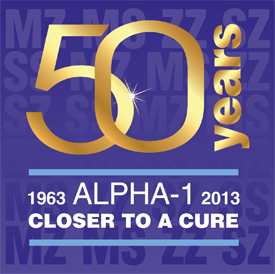 It’s a debilitating and potentially deadly condition that can take a long time to diagnose, but progress in treating Alpha-1 Antitrypsin Deficiency (Alpha-1) has added years to many patients’ lives already. Now, exciting potential new treatments such as stem cell and gene therapy are on the horizon for this rare genetic condition, which attacks the lungs and the liver.
It’s a debilitating and potentially deadly condition that can take a long time to diagnose, but progress in treating Alpha-1 Antitrypsin Deficiency (Alpha-1) has added years to many patients’ lives already. Now, exciting potential new treatments such as stem cell and gene therapy are on the horizon for this rare genetic condition, which attacks the lungs and the liver.
Past milestones and future treatment prospects will be described by world-renowned Alpha-1 researchers, including UMass Medical School faculty, at a free program on Saturday, April 20, at the Albert Sherman Center. The event is geared toward the entire Alpha-1 community, including patients, family members and health care providers.
The program, “50 Years of Research Toward a Cure for Alpha-1 Antitrypsin Deficiency,” is one of several events being sponsored worldwide by the Alpha-1 Foundation to commemorate the discovery of Alpha-1 Antitrypsin Deficiency in 1963.
Speakers include Ronald Crystal, MD, of Weill Cornell Medical College, who spearheaded the research that led to the first FDA-approved treatment for the Alpha-1 lung disease, called augmentation therapy, 25 years ago. Terence R. Flotte, MD, is also speaking. In 1995, Dr Flotte was part of a research team at Johns Hopkins that, in a clinical trial, was the first to use the adeno-associated virus (AAV) as a vehicle to deliver corrective genes into the body. That first study was in cystic fibrosis, another lung-crippling genetic disease. Flotte later initiated the first gene therapy trials in Alpha-1, and those are currently ongoing. Flotte is executive deputy chancellor, provost and dean of the School of Medicine, and the Celia and Isaac Haidak Professor of Medical Education and professor of pediatrics and microbiology & physiological systems. He is also co-hosting this month’s event.
Tough to treat
Alpha-1 antitrypsin deficiency affects at least 100,000 people in the United States. However, an estimated 20 million people carry the gene for the disease and could pass it to their children. That’s as many as carry mutations for cystic fibrosis, which is much more widely recognized. Unlike CF patients, people with Alpha-1 often don’t develop noticeable symptoms until adulthood and doctors rarely screen for the disease. If the patient smokes, their physician may attribute their symptoms entirely to smoking.
“We are missing nine cases for every case diagnosed,” said Flotte.
The alpha-1 antitrypsin protein protects healthy lung tissue from being degraded by certain enzymes. The key symptoms are progressive shortness of breath and liver failure. For many years, most patients in the United States have been treated with augmentation therapy, which comprises regular infusions of replacement alpha-1 protein. They are also advised to avoid exposure to certain environmental factors, particularly cigarette smoke.
Lung transplant is the treatment of last resort for end-stage lung disease, but relatively few patients are eligible for the procedure, which also requires a lifetime of multiple anti-rejection medications. Both augmentation therapy and transplants have drawbacks and neither is a cure. More early detection and new treatments that do a better job getting the protein into the right organs are needed.
“This is a disease that appears treatable by gene therapy, and possibly other breakthrough methods as well,” said Flotte.
World-renowned “Alpha docs” speaking
The event features speakers representing “the leading Alpha-1 clinicians and researchers in the world,” said John Walsh, president and CEO of the Alpha-1 Foundation. “We’ll be hearing about cutting-edge research from some of the world’s finest ‘Alpha docs’—but in language we non-scientists can understand.”
Featured speakers and their topics are:
• Robert Sandhaus, MD, PhD, clinical director of the Alpha-1 Foundation and medical director of AlphaNet, on “The Past, Present and Future of Alpha-1.”
• Ronald Crystal, MD, on “Therapy for Alpha-1 Antitrypsin Deficiency with Protein or Gene.”
• Darrell Kotton, MD, of the Boston University School of Medicine on “Next Generation Regeneration: In Pursuit of Stem Cell Therapies for Alphas.”
• Christian Mueller, PhD, assistant professor of pediatrics,, on “The Good, the Bad and the Augmentation of Alpha-1 Antitrypsin.”
• Terence R. Flotte, MD, on “Clinical Gene Therapy Trials for Alpha-1.”
Continuing education credits for doctors, nurses and respiratory therapists are being offered as part of the program. Registration begins at 12:30 p.m. with the talks starting at 1 p.m. A dinner and reception follow at 4 p.m. The dinner is free but reservations are required. For more information contact Angela McBride amcbride@alpha-1foundation.org (Tel: 305.567.9888 ext 233) or Sofia Mueller Sofia.Mueller@umassmed.edu (Tel: 508.856.4339).